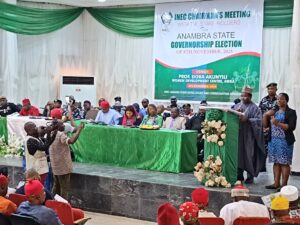Nigeria’s ongoing economic reforms are still facing challenges, according to the latest report from the International Monetary Fund (IMF). Nearly 18 months after these reforms began, Nigeria’s growth rate remains below the regional average for Sub-Saharan Africa. The IMF’s report highlights that inflation, exchange rates, and debt burdens continue to hold back the country’s economic progress.
The report reveals that while some countries in Africa, like Ghana and Zambia, have made positive strides in their reforms, Nigeria is not among them. Nigeria’s growth rate is forecast at just 3.19% for 2024, falling short of the regional average of 3.6%. Inflation has become a serious issue, with the rate rising back up to 33.8%, far above the 21% target for the year. This persistent inflation is part of the reason why Nigeria’s economy is struggling.
The IMF also notes that Nigeria’s debt burden is becoming unsustainable. Interest payments on debt are taking up a large portion of the country’s revenue, limiting the government’s ability to invest in important public services. Nigeria is among the countries most affected by this issue, which has led to fiscal stress and reduced resources for development projects.
In the agricultural sector, Nigeria has been struggling to implement reforms aimed at improving food security and supporting farmers. Despite efforts from the government to invest in agriculture, the country remains one of the most food-insecure nations globally, ranking 5th in the world for food insecurity. High food prices continue to make essential staples unaffordable for millions of Nigerians.
Experts believe that while agricultural reforms are necessary, the current approach has been slow and not impactful enough. One major issue is that smallholder farmers, who are key to the nation’s food supply, still lack sufficient resources and support. Factors like high input costs, poor access to credit, insecurity in farming areas, and inadequate infrastructure make it difficult for farmers to thrive.
Organizations like ActionAid Nigeria argue that the government’s focus on agriculture needs to be more people-centered. Addressing issues such as poverty, inequality, and lack of rural development will be essential for improving food security. They call for better access to subsidized farming inputs, improved rural security, and climate-resilient agricultural practices to boost productivity and lower food prices.
The All Farmers Association of Nigeria (AFAN) has also pointed out that while the government’s efforts in agriculture are commendable, implementation has been slow. The reforms need to be more practical and focused on the needs of small-scale farmers. Access to resources, including direct access to farm inputs, is essential for improving productivity.
Nigeria’s agricultural policies, like the National Agricultural Technology and Innovation Policy (NATIP), show promise, but their implementation has been inconsistent. AFAN urges the government to focus on increasing funding for agricultural projects, improving security in farming areas, and ensuring that reforms reach the grassroots level.







